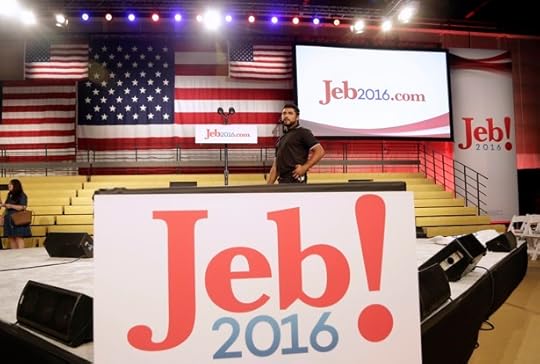The Mononymy Trap

Run, Hillary, Run.
Stand With Rand.
Jeb!
Every election seems to crystallize around a theme. It’s early yet, but could the theme of 2016 be mononymy?
That’s the formal term for the use of a single name, and it’s unusually popular with this year’s presidential hopefuls, with three leading contenders branding themselves sans surnames. Hillary Clinton has been using only her first name since she launched her own political career with a campaign for Senate in New York in 2000. She’s joined by Rand Paul, the senator from Kentucky. And over the weekend, Jeb Bush revealed his own logo for the 2016 race: Jeb!, with the exclamation mark included. He, too, has used that moniker before, in his races for Florida governor.
Perhaps this is just the symptom of an informal age—a time when people naturally gravitate toward unearned familiarity, when strangers and telemarketers address us by our first names or (shudder) Twitter handles, and when politicians can dispense with even the most basic formality and send us a Snapchat directly. Yet there remains something of a stigma against the practice. Manners curmudgeons still
It's Okay to Call Her 'Hillary'
Hillary has been grappling with the dilemmas of nomenclature for decades now. During the 2000 campaign, her logo simply read “Hillary.” It was a time when Democratic politicians weren’t quite sure what to do with the Clinton name—Al Gore, the party’s nominee for president that year, ran away from it, only to be criticized later on. When Hillary Clinton launched her presidential bid in 2007, she again stuck with her given name, a decision that Candid Camera’s Peter Funt—of all people!—mused on in The New York Times. This time around, her logo is a simple “H” with an arrow, but the nickname is firmly entrenched by now.
Last year, my colleague Peter Beinart made the case for journalists to call her “Hillary” too. For one thing, it’s simply much easier: “Clinton” could mean Hillary or Bill. And he rebutted critics who claim it’s sexist and patronizing, noting that Hillary herself had pushed the name.
It’s undeniable, though, that Hillary Clinton’s name has long been a battlefield in the conflict over feminism and naming. When she married Bill Clinton, Hillary Rodham opted to keep her maiden name—a controversial choice in 1970s Arkansas. It was only during Bill’s 1982 comeback campaign (he’d been tossed from the governor’s office after one term) that she decided that political expediency bested personal pride, and she became Hillary Clinton. During Bill’s 1992 campaign, she opted for the comprehensive “Hillary Rodham Clinton.” But that’s quite a mouthful—and if, like Hillary, you were a candidate who’s sometimes been criticized for being distant and remote, perhaps you’d avoid a seven-syllable introduction, too.
The best reason to be skeptical of using a first name alone is a quick review of what has happened to candidates abroad who have used it. Take Luiz Inacio da Silva, the former Brazilian president more commonly known as “Lula.” Sure, he was wildly popular when in office; but now his successor is embattled, the economy is tanking, and the apparatus he set up seems riddled with corruption. Or look to Britain, where Tony Blair cemented his “Cool Britannia” takeover by declaring at his first cabinet meeting that he was eschewing with formal titles: “Just call me Tony.” How’d that work out? Blair left office widely disliked, his party is still lost in the political wilderness, and the members of Oasis still can’t stand each other. Perhaps he or she who has a last name gets the last word.









Atlantic Monthly Contributors's Blog
- Atlantic Monthly Contributors's profile
- 1 follower



